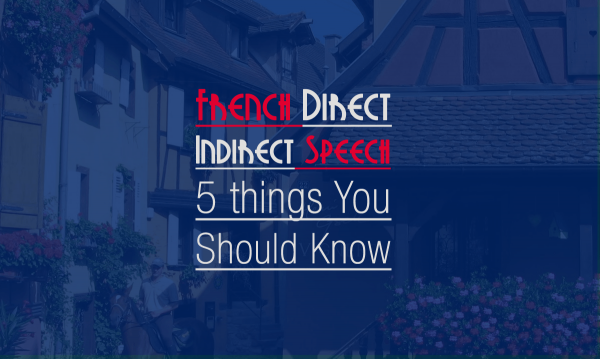Are you ready to learn about direct and indirect speech in French?
Here in this lesson, we've simplified the rules to make learning about French direct and indirect speech a breeze for you.

So sit back and let's enjoy this short lesson, starting with this little gem from Henri le Chat Noir, a cat quite famous on the internet for being too French for his own good.

Henri says, "Only an idiot would surrender his dignity to this folly." ...This is what direct speech looks like.
or
Henri says that only an idiot would surrender his dignity to this folly. ...This is indirect speech.
Notice the difference? Of course you would. The first one uses exactly the same words Henri said: verbatim and using quotes. In the second one, the speech was reported with no quotations, with the help of a subordinate clause.
And that, ladies and gentlemen, is the direct and indirect speech for you. (Thank you, Henri, for the help!)
The good news is, it works the same way in French as it does in English.
Here are other things about French direct and indirect speech that you should know about.
1. Direct speech is a piece of cake.
Seriously, it’s a no-brainer. Here, take a look at this example.
Corey says, “I like burgers”. In French, it’s: Corey dit: “j'aime les hamburgers”.
See? It’s about as easy as crossing the street for this pigeon.
Which leads us to number 2.
2. Indirect speech is made up of a main clause, followed by a subordinate clause introduced by the relative pronoun ‘que’.
Or qu’ beside words that begin with a vowel or mute h just like il or elle.
Example: Corey dit qu’il aime les hamburgers. (Corey says he likes hamburgers.)
Still Stuck at Intermediate French?

Break through the plateau with our proven coaching and study method.
3. Direct speech may be pretty straightforward, but indirect speech in French sure is not.
You know how it is when you think everything’s going smoothly and then life suddenly doubles back and hits you in the gut for no reason? This is one of those times, unfortunately. Just when you thought you had it easy with direct speech, here comes indirect speech which is a lot more complicated and tedious.
Indirect speech in French requires some grammatical changes, just like it does in English. So expect some changes in the following parts of speech:
Example:
Corey dit: “j'aime mon hamburger”. Corey says,“I like my burger”. (direct)
Corey dit qu'il aime son hamburger. Corey says that he likes his burger”. (indirect)
Corey dit: “je veux manger mon hamburger”. Corey says,“I want to eat my burger.” (direct)
Corey dit qu'il veut manger son hamburger. Corey says he wants to eat his burger. (indirect)
Easy enough, but wait til it gets better. The example is in the present tense with the main clause ‘Corey says’ or ‘Corey’ dit stating a present event. But if it is in the past tense, you have to change the tense of the verb in the subordinate clause too.
Example:
Corey a dit: “je veux manger mon hamburger”. Corey said,“I want to eat my burger.” (direct)
Corey a dit qu'il voulait manger son hamburger. Corey said he wanted to eat his burger. (indirect)
Take a look at the list below.
Okay, now quit screaming. This will be over soon, I promise.
4. Reporting verbs are the ones which usually appear in indirect speech. Here is the list of the most common ones.
| affirmer | (to affirm or assert) |
| ajouter | (to add), |
| annoncer | (to announce) |
| crier | (to shout) |
| declarer | (to declare) |
| dire | (to say) |
| expliquer | (to explain) |
| insister | (to insist) |
| prétendre | (to claim) |
| proclamer | (to proclaim) |
| répondre | (to answer or reply) |
| soutenir | (to maintain) |
5. Indirect speech for questions.
You didn’t think we’d end this article without talking about questions, did you? Of course not. When it comes to changing a directly stated question into a reported one, the main rule is very simple: it becomes a statement (obviously!)
Here is another rule: If there is no question word in the sentence, the word si which corresponds to if or whether is used instead of que.
Example:
Claire a demandé, “Est-ce que je peux manger le burger?” Claire asked, “ Can I eat the burger ? “ (Direct speech)
Claire a demandé si elle pouvait manger le burger. Claire asked if she could eat the burger. (indirect speech)
Conclusion
So with that, we end our discussion. Questions? Need clarifications? Contact us in the comment section, we will reply as soon as possible.
For more simplified grammar lessons, check out our French Grammar Mastery Course.
Still Stuck at Intermediate French?

Break through the plateau with our proven coaching and study method.
P.S. You would be doing me a HUGE FAVOR by sharing it via Twitter or Facebook.

could you give an example of how future in direct speech gets converted into conditionnel in indirect speech
I will update this post a bit later this year with your request in mind. Thank you